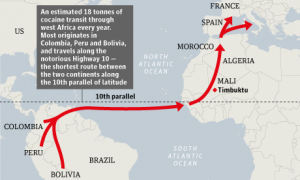NEWS GNOM.es
COASTAL authorities in Spain have warned jihad terrorist groups are now financing their operations with massive shippings of cannabis from north Africa to the south and east of Spain, southern France and the west coast of Italy.
Spanish customs officers are working closely with their counterparts in France, Portugal, Italy and the USA to combat the smuggling rackets, and say the most recent intercepted was on January 24 this year.
It was a fishing boat bearing an Italian flag, which was caught 138 nautical miles south-east of Cartagena (Murcia) carrying 8.9 tonnes of hash with a street value of €14 million.
Coastguards from the provinces of Alicante and Almería, immediately to the north and south of that of Murcia, arrested seven Italian nationals and one Egyptian.
An earlier operation involving National Police broke up a smugglinggang operating throughout Spain and led to 55 arrests and the confiscation of 22 tonnes of cannabis, firearms obtained in Libya and over €2m in cash, thought to have been shipped across from north Africa.
Police believe the money amassed from the smuggled drugs and weapons, which was being sent to Morocco, was destined for financing jihad cells.
Since early 2013, the European ‘coastal coalition’ has intercepted 18 boats carrying cannabis and one transporting cocaine, most of which were en route to Spain from Morocco.
Boats have been used ever since France commenced its military operations in Mali, which meant the previous ‘Sahel route’ through the desert was no longer viable.
The ‘Sahel route’, which runs through the middle of the triangle between the north of Mali and Niger, the south of Libya and Algeria and the east of Mauritania, is largely controlled by fundamentalist Islamic terrorist outfits such as Ansar Dine, Al-Qaeda’s outpost in the Islamic Maghrib, and the Movement for Unity and Jihad in Western Africa (MUYAO).
The 19 boats were found to be carrying a total of 244 tonnes of hash resin and 424 kilos of cocaine, the former of which had a total street value of €381m.
Although the most recent capture was a boat with an Italian flag and the one before that, Portuguese – the use of European vessels thought to be an attempt to avoid suspicion – most of the others bore standards from African countries.
The crafts were generally small, cheap and in a poor condition, barely seaworthy, say customs officials.
Very few crafts which leave Morocco head directly to European ports, since it would be difficult for such large cargoes of drugs to be unloaded there without arousing suspicion.
To this end, coastguard authorities say, they usually stop off in Libya or Egypt before heading on to France, Spain, Italy and sometimes, Greece and Turkey.
Spanish authorities have stopped and searched nine crafts in two years, only one of which appeared to be heading directly for Spain and which was spotted 50 miles south-east of Cartagena with six Moroccan crew members, who were arrested.
Italy caught two boats last summer, thought to be heading for Albania or Greece – one with a Moldavian flag apparently sailing towards Turkey and another, seen in the Sicilian canal, with a standard from Togo.
Their crew were said to be of Libyan and Syrian nationality, but many others are Egyptian, Moroccan or Turkish.
If they know they have been sighted, many prefer to set fire to their cargo and sink their boat instead of being caught, Spanish authorities say.
A boat intercepted at the end of November, 40 miles south of Almería, was carrying four gas bottles ready to explode – two of them were blown up, injuring two of the crew members, and Spanish customs officials managed to put the fire out.
Another Egyptian craft was deliberately sunk off the coast of Sardinia and Italian authorities only managed to seize 1.6 tonnes of the cannabis on board out of the total of 15 tonnes the boat was carrying.
Even though Spanish coastguard workers are active in the European anti-smuggling network, a recent change in national legislation – in the shape of the Law of Universal Justice – meant over 50 smugglers ended up being released because none of them were Spanish, they were not heading for Spain and were not in Spanish waters at the time they were caught by authorities from the country.
The National Court said Spain did not therefore have the legal power to capture, imprison and try them.
Later, the Supreme Court of Spain overruled this decision and ratified the country’s jurisdiction to intercept boats and arrest their crew ‘provided international treaties recognised Spain’s competence’ in this matter, referring to the 1988 Vienna Convention and the 1982 Montego Bay Convention.
Although the Supreme Court ordered the 50 or so released smugglers to be arrested again, most have not been traced.





